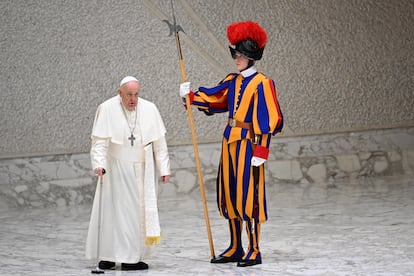Rebellion against the Vatican: 51 priests in Peru refuse to bless same-sex couples
The Prelature of Moyobamba, in the Peruvian jungle, has criticized the document that allows same-sex couples to receive blessings

A few weeks ago, during the Holy See’s Christmas greeting, Pope Francis urged cardinals, bishops and lay people to put aside their “rigid ideological positions that often, under the guise of good intentions, separate us from reality and prevent us from moving forward.” This statement could easily apply to the Territorial Prelature of Moyobamba in Peru, where clergy have attacked a new document that formally allows priests to bless same-sex couples. Although it does not approve same-sex marriage, the Fiducia supplicans document has been celebrated by progressive sectors, who see it as a breath of fresh air.
But this view is not shared by the priests in Moyobamba prelature, which is led by 63-year-old Spanish bishop Rafael Escudero López-Brea. “It is a grave abuse of the most holy name of God, which is invoked over an objectively sinful union of fornication, adultery or, even worse, homosexual activity,” said López-Brea, who arrived in Peru in 2004. “Homosexual acts are disordered, and, above all, contrary to natural law. God does not contradict himself. God does not lie to us. God, who always loves the sinner unconditionally, therefore seeks that he repent, be converted, and live.”
The bishop, born in the Spanish province of Toledo, claims that the Vatican’s change in policy “harms the communion of the Church,” and that allowing non-liturgical blessings is confusing because “the act, whether performed in an assembly or in private, imparted by a minister, is still a blessing of identical nature.” And he is willing to act on this belief: López-Brea has ordered his priests not to bless any couples in an irregular situation or in a same-sex relationship, in clear defiance of the Vatican.
In a statement, the 51 priests of the Prelature say they support the bishop’s position. “In total unanimity, without fissures, we abide by, subscribe to and appreciate the pastoral message of our bishop [...] Given the confusion and perplexity that the declaration has caused, we beg the Holy Father to annul the validity of the document and any statement that allows the administration of sacraments or blessings to people in objective mortal sin without repentance or desire for conversion,” the statement declared.
Neither the Peruvian Episcopal Conference nor the Archbishopric of Lima have spoken out about the disobedience of the Prelature of Moyobamba. Indeed, this is not the first time that López-Brea has shown his “ideological rigidity.” In April 2021, prior to the general elections in Peru, he told voters that “no Catholic should support with their vote candidates or parties that promote abortion, euthanasia, same-sex unions and gender ideology, if they do not want to be complicit in such perversions.” In his view, the heterosexual family is a non-negotiable principle that must be defended from “attempts to make the so-called equal marriage legally equivalent.”
The website Digital Religion has rejected López-Brea’s position, pointing out that the Prelature of Moyobamba welcomed Pedro Francisco Rodríguez Ramos for several seasons between 2005 and 2007, even though he was on trial for sexually abusing a minor in Toledo. He was later sentenced to seven years in prison. “On the one hand, they tear at their clothes, anathematize and ask the Pope to suspend the declaration that allows the blessing of gay couples. On the other hand, they welcome homosexual pedophiles [...] The bishop of Moyobamba had no qualms in welcoming in his diocese Pedro Francisco Rodríguez Ramos, the Karadima of Toledo,” the publication argued, in reference to Chilean priest Fernando Karadima, who was excommunicated for several cases of pedophilia and ephebophilia.
Sign up for our weekly newsletter to get more English-language news coverage from EL PAÍS USA Edition
Tu suscripción se está usando en otro dispositivo
¿Quieres añadir otro usuario a tu suscripción?
Si continúas leyendo en este dispositivo, no se podrá leer en el otro.
FlechaTu suscripción se está usando en otro dispositivo y solo puedes acceder a EL PAÍS desde un dispositivo a la vez.
Si quieres compartir tu cuenta, cambia tu suscripción a la modalidad Premium, así podrás añadir otro usuario. Cada uno accederá con su propia cuenta de email, lo que os permitirá personalizar vuestra experiencia en EL PAÍS.
¿Tienes una suscripción de empresa? Accede aquí para contratar más cuentas.
En el caso de no saber quién está usando tu cuenta, te recomendamos cambiar tu contraseña aquí.
Si decides continuar compartiendo tu cuenta, este mensaje se mostrará en tu dispositivo y en el de la otra persona que está usando tu cuenta de forma indefinida, afectando a tu experiencia de lectura. Puedes consultar aquí los términos y condiciones de la suscripción digital.









































